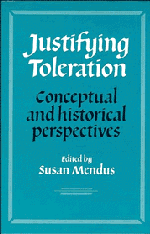Book contents
- Frontmatter
- Contents
- Preface
- Introduction
- 1 Scepticism and toleration in the seventeenth century
- 2 A more tolerant Hobbes?
- 3 Locke: toleration and the rationality of persecution
- 4 Toleration and Mill's liberty of thought and discussion
- 5 Rousseau and respect for others
- 6 The intolerable
- 7 Autonomy, toleration, and the harm principle
- 8 Friendship, truth, and politics: Hannah Arendt and toleration
- 9 Dissent, toleration, and civil rights in communism
- 10 Liberalism, marxism, and tolerance
- 11 Socialism and toleration
- Index
11 - Socialism and toleration
Published online by Cambridge University Press: 20 May 2010
- Frontmatter
- Contents
- Preface
- Introduction
- 1 Scepticism and toleration in the seventeenth century
- 2 A more tolerant Hobbes?
- 3 Locke: toleration and the rationality of persecution
- 4 Toleration and Mill's liberty of thought and discussion
- 5 Rousseau and respect for others
- 6 The intolerable
- 7 Autonomy, toleration, and the harm principle
- 8 Friendship, truth, and politics: Hannah Arendt and toleration
- 9 Dissent, toleration, and civil rights in communism
- 10 Liberalism, marxism, and tolerance
- 11 Socialism and toleration
- Index
Summary
Let me begin with a traveller's tale, set in the mid 1980s, that may serve to introduce our problem. A visitor from the West to, let us say, Moscow will observe a number of unfamiliar features in his new surroundings. He will notice, for example, the absence of The Times – unless he happens to be on the streets in the early hours of the morning, during that brief interlude between one van delivering the papers and another collecting them for transmission to the government department that has purchased all the copies. This he will probably have anticipated. He may, however, be a little more struck by the lack of cultural variety in his surroundings. There are no ostentatious youth subcultures; no quarters of the city where ethnic shops and restaurants flourish; no streets where gay pride is on show, or bookshops barred to men. Religious practices have not entirely disappeared, but church and synagogue are very largely the preserve of the elderly and there are no orange-robed monks parading in the streets. In short, the impression received is of a society where not only opinion but also culture is pressed as far as possible into a single mould that bears the label ‘socialism’.
Back home again, and opening The Times over breakfast, our traveller is quite likely to be confronted by a large advertisement from the G. L. C., fighting for its survival, and the standard-bearer of what is currently referred to as ‘municipal socialism’.
- Type
- Chapter
- Information
- Justifying TolerationConceptual and Historical Perspectives, pp. 237 - 254Publisher: Cambridge University PressPrint publication year: 1988
- 1
- Cited by



